Thoroughbreds are commonly bred to become sensational athletes, with their strong stature and superb blood lines; but when life in the fast lane ends, perhaps due to injury or because they fell short of pace, their future can be uncertain.
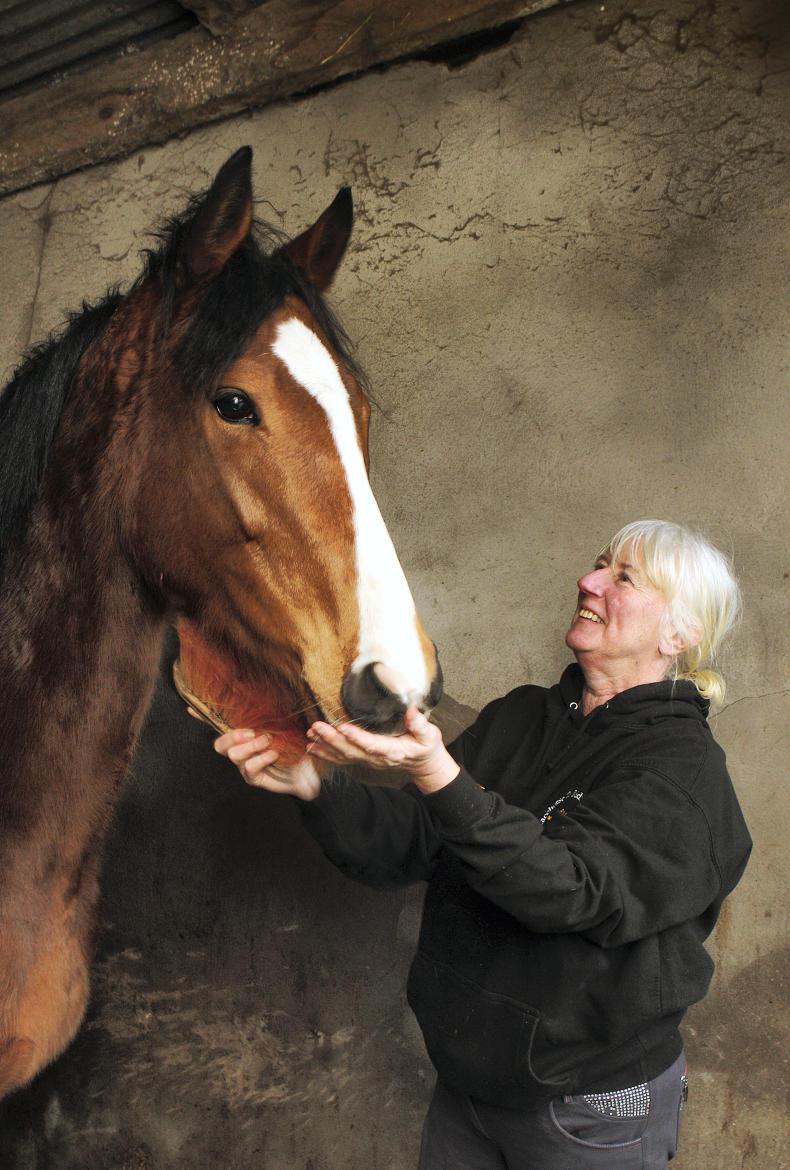
Julie Edgar Morris is the founder of Racehorse to Riding Horse Ireland, which organises competitions for ex-racehorses. She wanted to give thoroughbreds a new lease of life after racing and to show that they are more than a product of the sport. With contacts in the industry, Julie naturally progressed into helping others to rehome ex-racehorses.
Her base is an old point-to-point yard in Comber, Co Down, which is owned by Alec Murdock. It is where racehorse-turned-riding horse Sir Frederick, a former winner of the Galway Plate, was born and bred.
Despite never having her own horse until she was in her teens, Julie had a natural connection with them and when she went missing as a child, she wound up in their care.
“I was three-years-old and my parents took me to Mosney Butlins in Co Meath. I got lost and was found in the stables, sleeping with the horses.
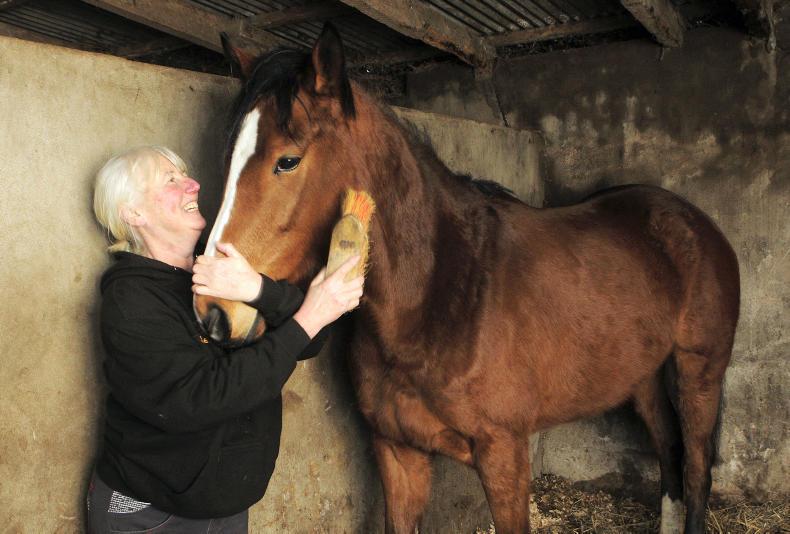
“I didn’t own a horse until I was 16, but anything to do with horses and I was there. I rode at riding club level and competed in England, where I represented the riding club. My kids went through pony club and they did the British Horse Society exams.”
Racehorse to Riding Horse Ireland
“Racehorse to Riding Horse Ireland began in 2011. We were out one night and somebody started to slag thoroughbreds, saying that they were only good for dog meat if they couldn’t race. I got annoyed about it and decided to set up Racehorse to Riding Horse Ireland.
“It started off with a six-week routine, with Killyhevlin Hotel sponsoring us. We organised classes at six county shows in Northern Ireland to see how we would get on. Then people came forward and asked if we could set up an organisation, and we’re still going strong.
“We established a committee and we organise classes, including retraining classes, open classes and performance classes. We want to promote the non-racing thoroughbred class. Competitions run from March to the end of August throughout the country. We run most of our classes through the big shows and we would have a few of our own shows as well.
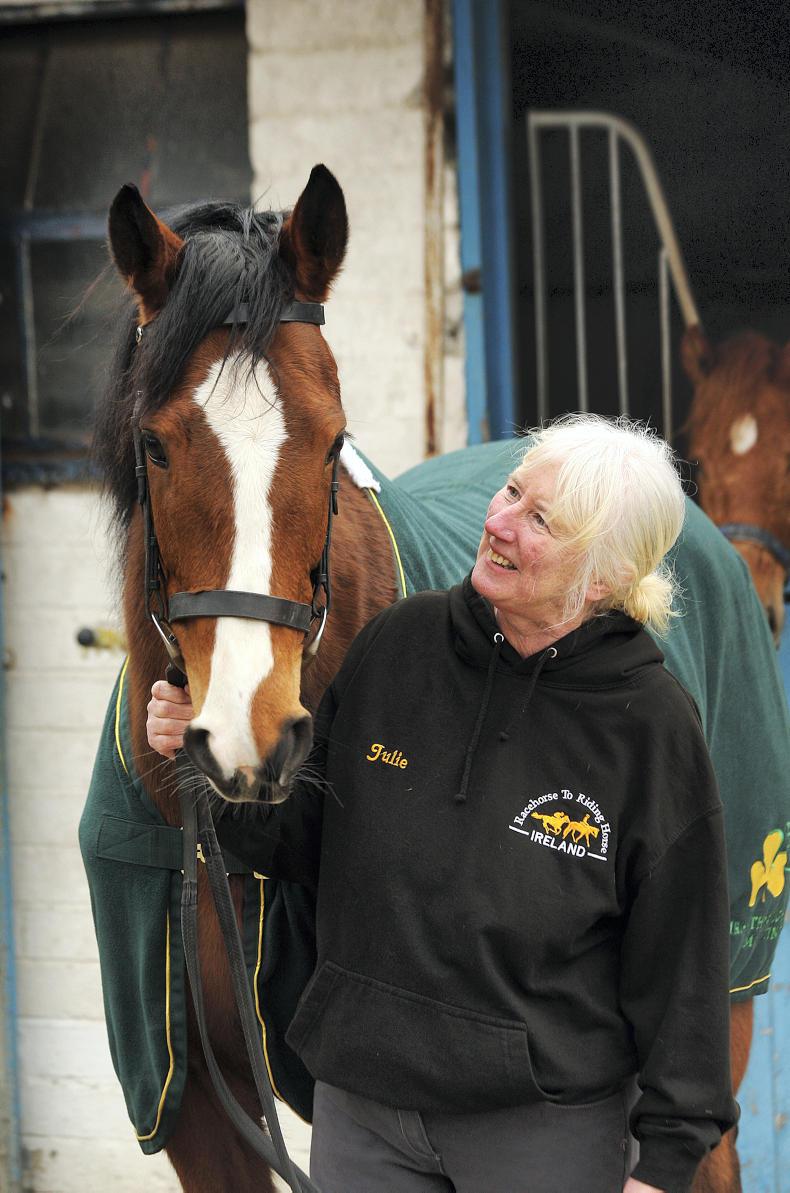
“We use score sheets for all our classes, we judge and score on obedience, control, manners and way of going. The horses are not untacked and conformation is not assessed. In our classes the judges aren’t told who the horses are because it gives everyone a chance. The four wildcard qualifiers for the RDS Dublin Horse Show are run under our rules through agreement with Irish Thoroughbred Marketing, which is a sponsor of the Racehorse to Riding Horse class.
Support
“Sponsors are so important, they help us to keep going. Irish Thoroughbred Marketing has been very good, it has stuck with us from 2012. Down Royal, which is now the Down Royal Corporation of Horse Breeders, continues to work with us and there are others who give us help and support too.
“We think of the classes as a stepping stone to go on and do other things, or just a day out if you want to have a bit of craic. A lady came to us at Boswell in 2012, that was her first show with her horse – now she is doing Grand Prix dressage. She is the first one with us to have gone on to do Grand Prix with an ex-racehorse since the association started.
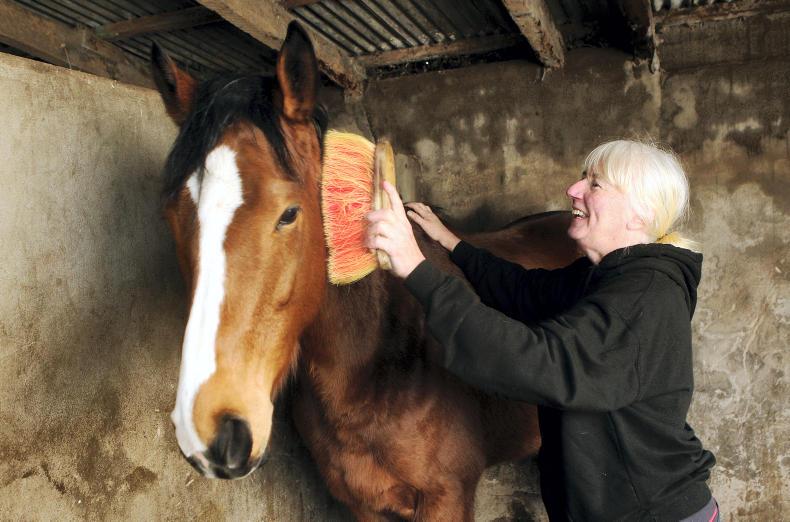
“One of Willie Mullins’ horses, Arvika Ligeonniere, he was a top horse; Louise Duffy started with us in 2015 and she brought him out. She came to shows and now she’s doing one-star eventing with him.
“We want to encourage people to look at ex-racehorses. Years ago before they had all this paperwork, people were buying them and didn’t know that they were ex-racehorses, but then the stigma appeared.
"In recent times racehorses are being trained more like event horses and normal riding horses. That has helped when transitioning them back to riding horses. It’s like anything else; if you start a new job, you give up what you’re doing today and you have to learn again, it’s the same for horses."
Rehoming
“We would rehome 80 ex-racehorses a year, on average. Rehoming is something that I do personally. People started to come to me saying: ‘We have a horse out of training, can you get it rehomed?’ And I would see what I could do. I would put up a notice and if someone approached me looking for a horse, I would introduce them.
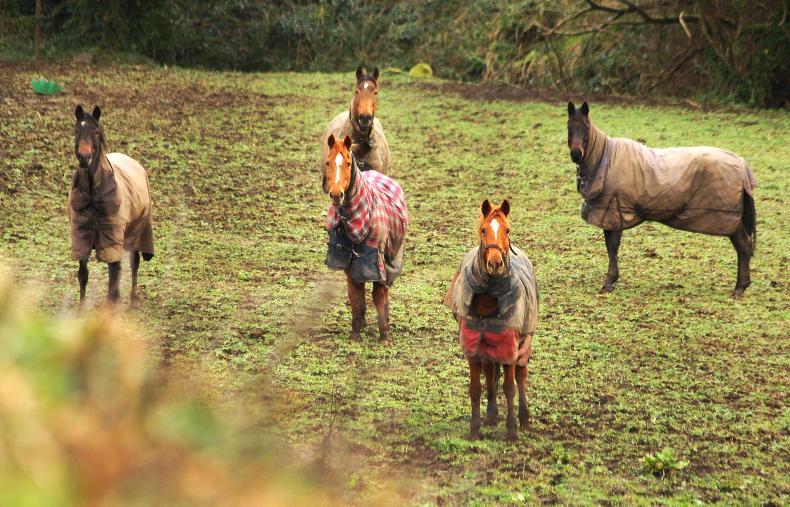
Julie Edgar Morris's horses pictured at Alec Murdock’s yard in Comber Co Down.
In terms of temperament, I don’t find them any different from any other horses. Horses are like people, it is how they are brought up and handled, and it’s your concept of them. You have to work for partnership.”
To find out more, visit Racehorse to Riding Horse Ireland’s Facebook page.
Read more
My Country Living: I'm running three marathons in wellies
My Country Living: from makeup and film, to farming
Thoroughbreds are commonly bred to become sensational athletes, with their strong stature and superb blood lines; but when life in the fast lane ends, perhaps due to injury or because they fell short of pace, their future can be uncertain.

Julie Edgar Morris is the founder of Racehorse to Riding Horse Ireland, which organises competitions for ex-racehorses. She wanted to give thoroughbreds a new lease of life after racing and to show that they are more than a product of the sport. With contacts in the industry, Julie naturally progressed into helping others to rehome ex-racehorses.
Her base is an old point-to-point yard in Comber, Co Down, which is owned by Alec Murdock. It is where racehorse-turned-riding horse Sir Frederick, a former winner of the Galway Plate, was born and bred.
Despite never having her own horse until she was in her teens, Julie had a natural connection with them and when she went missing as a child, she wound up in their care.
“I was three-years-old and my parents took me to Mosney Butlins in Co Meath. I got lost and was found in the stables, sleeping with the horses.

“I didn’t own a horse until I was 16, but anything to do with horses and I was there. I rode at riding club level and competed in England, where I represented the riding club. My kids went through pony club and they did the British Horse Society exams.”
Racehorse to Riding Horse Ireland
“Racehorse to Riding Horse Ireland began in 2011. We were out one night and somebody started to slag thoroughbreds, saying that they were only good for dog meat if they couldn’t race. I got annoyed about it and decided to set up Racehorse to Riding Horse Ireland.
“It started off with a six-week routine, with Killyhevlin Hotel sponsoring us. We organised classes at six county shows in Northern Ireland to see how we would get on. Then people came forward and asked if we could set up an organisation, and we’re still going strong.
“We established a committee and we organise classes, including retraining classes, open classes and performance classes. We want to promote the non-racing thoroughbred class. Competitions run from March to the end of August throughout the country. We run most of our classes through the big shows and we would have a few of our own shows as well.

“We use score sheets for all our classes, we judge and score on obedience, control, manners and way of going. The horses are not untacked and conformation is not assessed. In our classes the judges aren’t told who the horses are because it gives everyone a chance. The four wildcard qualifiers for the RDS Dublin Horse Show are run under our rules through agreement with Irish Thoroughbred Marketing, which is a sponsor of the Racehorse to Riding Horse class.
Support
“Sponsors are so important, they help us to keep going. Irish Thoroughbred Marketing has been very good, it has stuck with us from 2012. Down Royal, which is now the Down Royal Corporation of Horse Breeders, continues to work with us and there are others who give us help and support too.
“We think of the classes as a stepping stone to go on and do other things, or just a day out if you want to have a bit of craic. A lady came to us at Boswell in 2012, that was her first show with her horse – now she is doing Grand Prix dressage. She is the first one with us to have gone on to do Grand Prix with an ex-racehorse since the association started.

“One of Willie Mullins’ horses, Arvika Ligeonniere, he was a top horse; Louise Duffy started with us in 2015 and she brought him out. She came to shows and now she’s doing one-star eventing with him.
“We want to encourage people to look at ex-racehorses. Years ago before they had all this paperwork, people were buying them and didn’t know that they were ex-racehorses, but then the stigma appeared.
"In recent times racehorses are being trained more like event horses and normal riding horses. That has helped when transitioning them back to riding horses. It’s like anything else; if you start a new job, you give up what you’re doing today and you have to learn again, it’s the same for horses."
Rehoming
“We would rehome 80 ex-racehorses a year, on average. Rehoming is something that I do personally. People started to come to me saying: ‘We have a horse out of training, can you get it rehomed?’ And I would see what I could do. I would put up a notice and if someone approached me looking for a horse, I would introduce them.

Julie Edgar Morris's horses pictured at Alec Murdock’s yard in Comber Co Down.
In terms of temperament, I don’t find them any different from any other horses. Horses are like people, it is how they are brought up and handled, and it’s your concept of them. You have to work for partnership.”
To find out more, visit Racehorse to Riding Horse Ireland’s Facebook page.
Read more
My Country Living: I'm running three marathons in wellies
My Country Living: from makeup and film, to farming









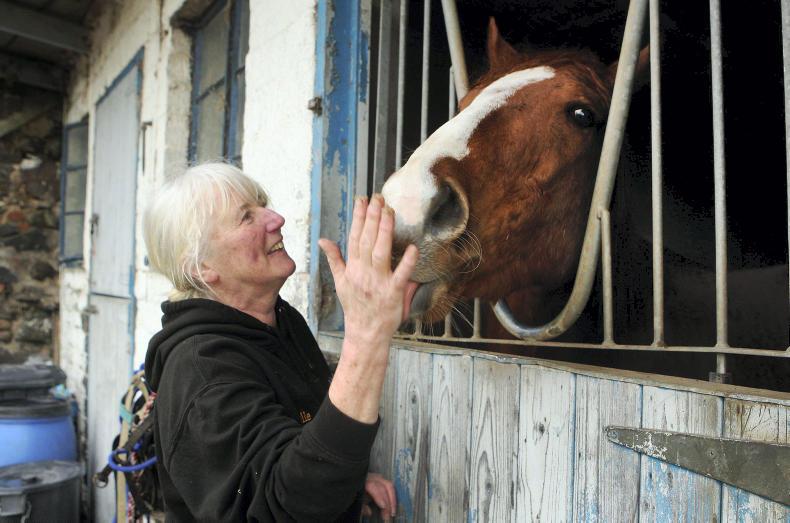
SHARING OPTIONS